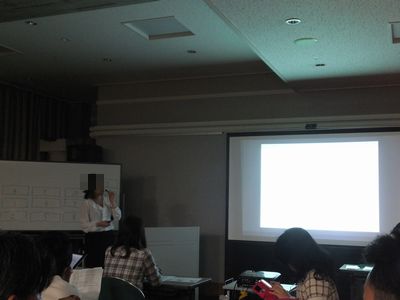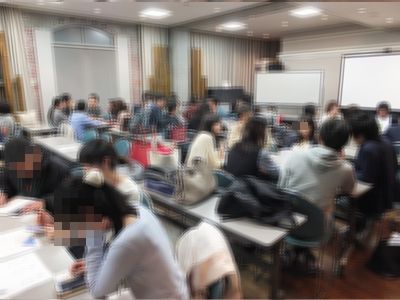1.マテリアルの紹介 Yさん

2.マテリアルの紹介 Uさん

3.ディスカッション中の様子

:::::::::::::::::::::::::::::::::::::::::::::::::::::::::::::::::::::::::::::::
《 今回のworkshop 》
○workshop参加人数:72名(うち新人の方:8名)
○【前半】: How Artificial Intelligence (AI) Will Change Recruitment?
○【後半】:LGBT become foster parents?
:::::::::::::::::::::::::::::::::::::::::::::::::::::::::::::::::::::::::::::::::
みなさまこんばんは、E’s club幹事のKです。
4月22日(土) 開催の第149回workshopの詳細をお送りいたします。
今回は前半のマテリアルをYさん、 後半のマテリアルをUさんにご作成いただきました。
前半は”How Artificial Intelligence (AI) Will Change Recruitment?”、後半は”LGBT become foster parents?” というタイトルでそれぞれディスカッションを行います。
前半と後半のリンク先には参考画像等がありますので、 事前に閲覧お願いいたします。
[今週のマテリアル]
≪FIRST HALF≫
How Artificial Intelligence (AI) Will Change Recruitment?
~Does face to face communication really matter?~
Artificial Intelligence (AI) has been changing our business scenes, and major industries moved from manual labor into automation. Recruitment activity is no exception.
As introduced in a published book titled “Work Rules”, Google launched an AI approach to recruitment which enable them to find the perfect candidate out of 300 million online profile.
In Japan, METI (Ministry of Economy, Trade and Industry) follows this move by including AI utilization on recruitment in “New Industrial Vision Plan” submitted on April 2017.
Given such circumstances, please share your idea on following questions.
[Tips for discussion]
AI is utilized such as…
・to identify the appropriate candidate who has competencies which company requires by analyzing big data (profile, application form, pass or fail result, and correlation between them)
・to do job interview with candidates, longer time with less money
Benefits:
・to eliminate consumed time and money for recruitment
・to prevent opportunity loss by 24-hour-interview conducted by AI Robot
・to set recruitment standards (no emotional feeling involved)
Subjects to be addressed:
・need to collect accumulated data to improve accuracy
・need to set many prerequisites for AI to deal with various kinds of activity
[General Questions]
Q1. Does your company launch AI approach to any business scene? If so, please share how it is utilized and welcomed (or not welcomed).
Q2. Do you think “job automation by AI” is a good idea? Please share pro and con. Also, what field do you think could be most effective for AI utilization?
[Questions of Recruitment]
Q3. Do you think “face to face communication” between company and candidate still remained in recruitment even after AI implemented? Please share your idea.
Q4. Several companies start to implement “Face Diagnosis (Kao Shindan)” in recruitment process.
Ex1: Hakuhodo Inc. implemented “Face Diagnosis” to diagnose a job type suitable for each candidate according to their face type.
Ex2: Tokyu Agency Inc. implemented “Face Recruitment” to offer different job interview process for each candidate according to their face type.
Do you think “Face Diagnosis“ could be practicable as a recruitment tool? Please share your idea.
Q5. Image you are assigned as a member of “Face Diagnosis Launch Project” to find “creative talent” for your company, what kind of face type would you set as standard for “creative talent”? Please discuss in each group and draw a standard face type.
Your group idea of Q5 will be shared to the group next to you at the end of First Half (18:50-19:00)
References: (If you have few mins, please read)
Face Diagnosis by Hakuhodo Inc.
https://www.advertimes.com/ 20150428/article190948/
Face Recruitment by Tokyu Agency Inc.
http://netgeek.biz/archives/ 30782
≪LATTER HALF≫
Agenda: LGBT become foster parents?
Reference 1:
http://www.japantimes.co.jp/ news/2017/04/06/national/ social-issues/osaka-becomes- first-japanese-city-recognize- sex-couple-foster-parents/#. WOg_MIFcXqC
Osaka the first city in Japan to certify gay couple as foster parents.
The city of Osaka has officially recognized a same-sex couple as foster parents, becoming the first municipality in the nation to do so, according to municipal and central government officials.
The city government formally recognized two men in their 30s and 40s as foster parents of a teenage boy who has been under their care since February. The couple asked to remain anonymous.
The Health, Labor and Welfare Ministry said Wednesday there is “no precedent” for a same-sex couple being certified as foster parents.
The city granted the their request to become guardians after determining they understood the foster care system and had the financial wherewithal to raise a child.
Support has been growing for protecting the rights of lesbian, gay, bisexual and transgender people, and municipal governments are gradually recognizing same-sex partnerships as equivalent to marriage.
Traditionally, only married couples or individuals are allowed to become foster parents. Members of the LGBT community have been eligible to foster children, but only as individuals.
“I am happy we became foster parents (and recognized) as a single household, not just as individuals,” the older of the two men said, adding the boy is now “living a comfortable life as he talks about his school and friends.”
The man said he thought it is important for a child to “have an adult who gives affection on a one-on-one level and affirms his or her presence.”
It has been about two months since the couple started acting as the boy’s foster parents. He goes to school every day from home and receives home-cooked meals when he returns, the man said.
“The boy may feel puzzled to live with people who were not with him when he was in an early age,” he said. “But we hope to become the ones who think of him first and can be relied on when he is in need.”
Previously, a female couple in the Kanto region were recognized as eligible to become foster parents, but only individually. They raised the one child together after each was granted custody.
The gay couple from Osaka consulted the city’s child consultation center in autumn 2015 about becoming foster parents.
They attended lectures, training and reviews by the center, as well as screening by the city’s social welfare panel. The couple was officially recognized on Dec. 22, 2016, as foster parents with guardianship of a child under 18.
There is no law excluding same-sex couples from being foster parents. But as of March 1, 2015, the 3,704 foster homes nationwide comprised 3,216 married couples and 488 single-parent households, government data shows.
Compared with other countries where it is more commonplace to see gay and lesbian couples fostering children, Japan lags because many LGBT applicants are turned away at the door.
A support group for same-sex couples welcomed Osaka’s decision and called for creating an environment where anyone can become foster parents if they can raise children with affection.
As of March 2016, there were about 45,000 neglected or physically abused children in need of foster care, according to the welfare ministry.
The central government also set up a “family homes” program in 2009 where children live in small group homes with multiple foster carers. While the government recommends raising children in a homelike environment, only 17.5 percent children in need of homes were able to do so as of March 2016, compared with 30 percent to 70 percent in the United States and major European countries in 2002.
“The places that can accept children will increase if there are various types of foster parents, and not just male-female couples,” said Megumi Fuji, who heads Rainbow Foster Care, which supports allowing same-sex couples to become foster parents.
According to Fuji, many same-sex couples looking to become prospective parents have been rejected by public authorities. They are told, “Children will never be fostered” by same-sex couples or “couples of friends are not accepted.”
“It is very small-minded to think that only couples of men and women can realize an ideal family,” Fuji said. “Whether they have an aptitude for raising children is important.”
Reference 2:
https://www.google.co.jp/amp/ s/amp.businessinsider.com/the- scientific-truth-about-kids- who-grow-up-with-same-sex- parents-2015-6
Questions:
1. What do you think about LGBT?
2. If LGBT is allowed to be foster parents, what kind of advantage and disadvantage does it have?
3. Do you agree that LGBT is allowed to be foster parents?
4. Do you think LGBT foster parents and their children can be accepted by society? If not, what kind of obstacles they need to overcome?
5. There are 45,000 children who are in need of social care such as abused children and only 8% of them live with foster parents. Should we encourage to increase LGBT foster parents for those children?
***********************************************************
私たちと一緒に英語コミュニケーション能力を鍛えませんか?
ご興味を持たれた方は、
入会申込フォーム
https://english-speaking-club.com/cms/?page_id=93
よりお申し込みください。お待ちしています!
***********************************************************